|
|
| |
■
『世界の英語教室 (小学校)』[韓国編]
 New!
New!
「韓国の小学校英語教育〜取材を終えて見えたこと〜」9/26アップしました。
こちらも合わせてご覧下さい。(Click here!) New!
Hello from South Korea! (韓国からこんにちは!)
By Mina Hisada/Illustration by Puri
|
 今回の特集は、韓国(正式名称・大韓民国)。成田から2時間半で行けるこの隣国は、とりわけ英語教育の盛んな国としても知られている。公立の小学校で英語教育が義務づけられたのは今からさかのぼること9年前の1997年。以来、全国の小学校で3年生から英語が教えられている。
今回の特集は、韓国(正式名称・大韓民国)。成田から2時間半で行けるこの隣国は、とりわけ英語教育の盛んな国としても知られている。公立の小学校で英語教育が義務づけられたのは今からさかのぼること9年前の1997年。以来、全国の小学校で3年生から英語が教えられている。
(This month, we feature South Korea (official name: Republic of Korea). It takes only two and half hour from Narita to Seoul by plane. Koreans are well-known for being passionate about English education. For nine years now (from 1997), English has been taught to elementary school students from Grade 3.)
韓国語は日本語と語順が同じで、その言語構造は英語とはかなり異なる。また、外来語の多さから英語の発音に悩まされている点でも日本と共通している。英語学習におけるハンディを、彼らはどのように克服しているのだろうか。
(Korean word order is the same as Japanese, and so its grammar is quite different from English. Having a common background, Japanese and Koreans have similar problems learning English. How do they deal with this?)
日本で小学校の英語教育が議論される中、韓国では現状から2学年下げて、小学校1年生から英語教育を始める案がほぼまとまった(2008年度からスタートする予定)。
(While Japan discusses whether or not English is necessary at all in Japanese elementary school, South Korea is pressing ahead to start English education in Grade 1 of elementary school. This plan is set to start in 2008. )
なぜこれほどまでに韓国は早期英語教育を推進するのか。それにはどのようなメリットやデメリットがあるのだろうか。今回それを現地の小学生の実状を通じて探ってみたい。
(Why are they focusing so much on early English education? What are its merits and its demerits? Let's explore the background to these questions by talking to one elementary school student.)
|
|
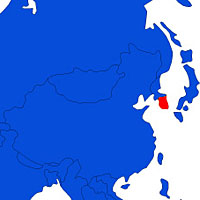
第7回目の今回は、韓国の小学生にスポットライトを
当てます。
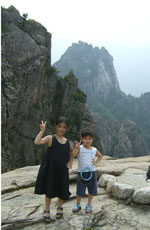 |
| Hello from South Korea |
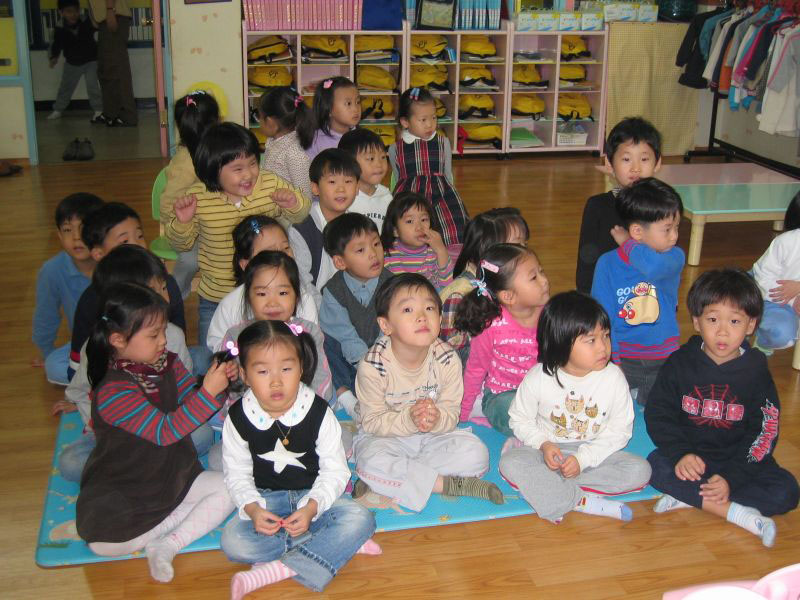 |
英語教育は幼稚園から?
ソウル市内の幼稚園にて |
|
|
 |
| ソウル市内の教会 |
<ひとくちメモ>
☆韓国の人口は約4,800万人。国民の4分の1がキリスト教徒だ(ちなみに、日本のキリスト教徒は人口の1パーセントにも満たない)。韓国でキリスト教が広まったのは、まず日本の植民地から開放された1945年以降、そして朝鮮戦争以降(1953年以降)だといわれている。韓国は元々儒教の国だったが、現在はフィリピンと並んでアジアのキリスト教国となっている。
(The population of South Korea is about 48,000,000. One in four South Koreans is Christian, whereas only one percent of the Japanese population is Christian. It's said that Christianity spread after South Korea declared independence from Japan in 1945 and after the Korean War in 1953. "Confucianism," however, remains the traditional mindset, even though it comes second only to the Philippines as the most Christian country in Asia.)
|
■PART 1
今日のお友達:韓国のミンジュちゃん※(9歳)
(Today, we have here Min-ju , who is 9 years old.)
※通常韓国では、年齢は数え年になります。つまり、生まれたときは1歳になります。
  ミンジュ --Min-Ju (9 years old).
(My name is Min-Ju.)
ミンジュ --Min-Ju (9 years old).
(My name is Min-Ju.)
"Min" means "develop", "Ju" means "Pillar".
※最近では、漢字を使わずにハングルのみで名前をつけるのも主流になってきているようです(日本人でいえば、漢字を使わず、ひらがなだけの名前をつける、という感じです)。
(Recently, young parents have started giving their children names that use Korean letters, not Chinese letters.)
|

 アッパ(お父さん)とオンマ(お母さん)
アッパ(お父さん)とオンマ(お母さん)
(My hero is "my parents.")
※韓国の子供は、お父さんのことは「アッパ」、お母さんのことは「オンマ」と呼びます。
("Appa" means "Dad" and "Onma" means "Mum.")
|

 アニメがいっぱいある国?よく分からない。韓国と同じアジアにあるんでしょ?
アニメがいっぱいある国?よく分からない。韓国と同じアジアにあるんでしょ?
(About Japan: Animation? I don't know. It's in Asia like my country, right?)
|
|
| |
|
|
| |
|
|
|
|
Photos by Hirotsugu KOSHIN
 |
 |
 |
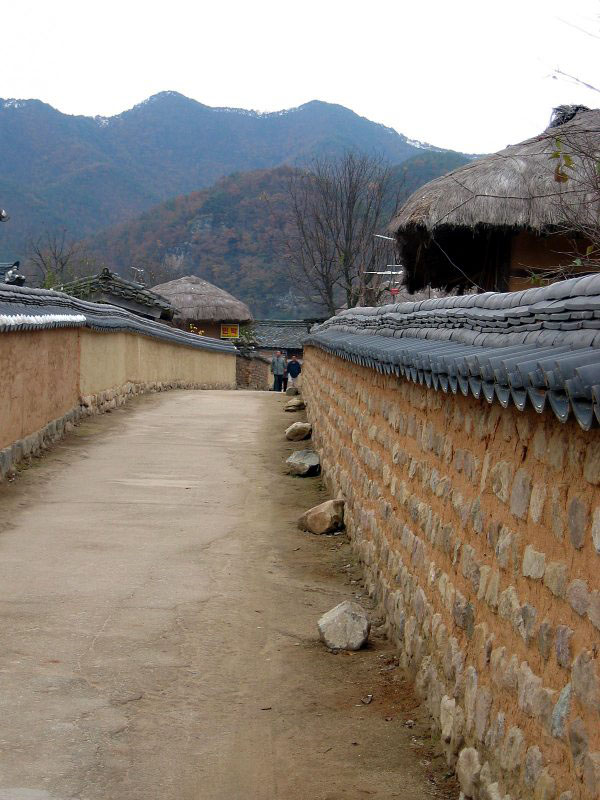 |
(ソウル近郊・マンション群)
|
(紅島の岩石) |
(海印寺) |
(安東河回村・儒教の色彩が残る村・多くの両班を生み出している) |
|
|
|
■PART 2
公立の小学校に通うミンジュちゃん。どんな学校生活を送っているのかな?
A typical week for Min-ju. (^o^)丿
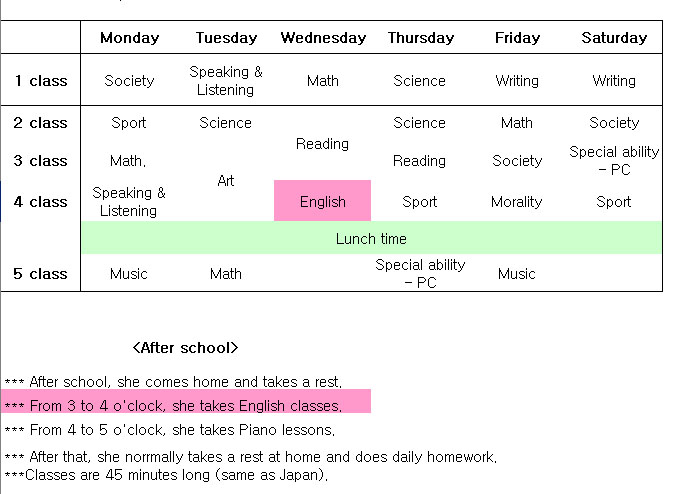
↑ミンジュちゃんの時間割り。
クリックすると大きくなります。
(Click here!)
|
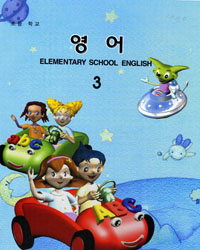
(小学校3年生の教科書・表紙)
|
|
● 国語のクラスは4つにわかれています。
(Korean lessons are divided into four components.)
1)お話をする時間
(Speaking)
2)お話を聞く時間
(listening)
3)書く方法を教わる時間
(writing)
4)読書の時間
(Reading)
●学校によっては、小学校から、英語以外の外国語を勉強することができます。
※小学校には「裁量の時間」というのがあります。
この時間内で学べる外国語のうち、最近特に人気があるのは中国語で、次に日本語です。
(Depending on the school, children can study foreign languages other than English. Chinese is most popular, followed by Japanese.)
●英語は「生活英語」(=コミュニケーションできる英語)
を目標としています。ミンジュちゃんの学年(小学校3年)では、聞くことや話すことに重点がおかれます。まだ、アルファベットの学習はしません。学年で勉強する単語の数は大体
80〜120語です。
(To be able to communicate in English is the main goal of the English education system there. In Grade 3, listening and writing are the main components. The alphabet is not taught at this stage. The children learn about 80 to 120 words in total.)
|
Photos by Hirotsugu KOSHIN
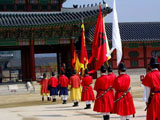 |
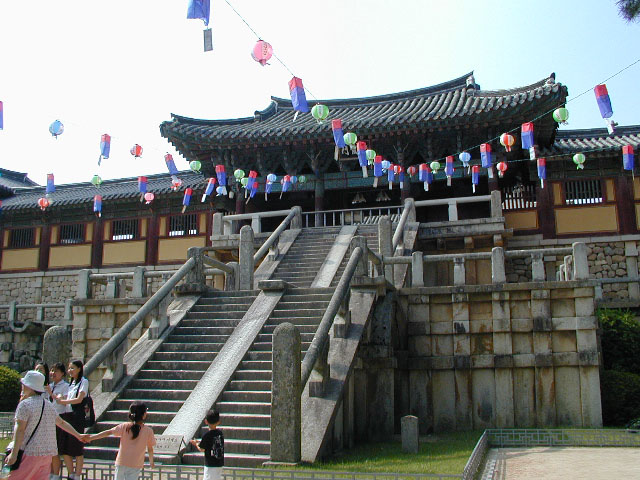 |
 |
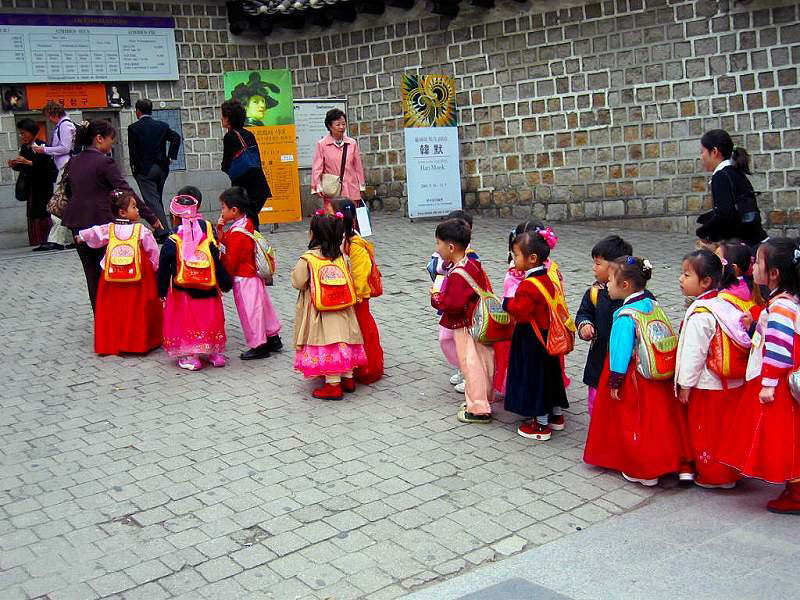 |
(景福宮)
|
(仏国寺) |
(黒山島) |
(徳寿宮前にて) |
|
■PART 3
韓国英語の特徴
(Konglish and its features)
★特徴1(Characteristic 1)★
☆もとは英語であったにもかかわらず、それが韓国語に取り入れられた影響で、その単語を発音するときに韓国語風の発音になってしまう
(English words are pronounced with a Korean accent.)
Example) 1
coffee →コッピ
cheese →チズ
(For example: coffee→koppi、cheese→chizu)
☆外来語の影響で、アクセントを前につけてしまいがちである
(The accent usually falls on the first syllable, for imported words.)
Example) 2
Parking→パーキング
、テレビ、
(For example: Parking, Television, Towel)
|
★特徴2(Characteristic 2)★
☆ FをPと発音しがちである
(F is pronounced as P)
Example) 1:イフ→イプ、フランス→プランス、など。
For example, If → IP, France → Prance
例文:私は昨年フランスにいました。
Example)
I was in France last year.
★特徴3(Characteristic 3)★
☆冠詞を抜かしてしまいがち
(Articles are left out.)
※韓国語にも、日本語と同じく冠詞がないため
(Like Japanese, there are no articles in Korean.)
|
|
★森田さんは、韓国の大学で日本語講師をしていました。韓国英語の特徴について語って
いただきました。
(Mr. Morita was a lecturer in Japanese at a university in South Korea. Let's hear his opinion on Korean English.)
|
|
韓国語も文法構造が「主語・目的語・動詞」の順番なので、文法面でも日本人の英語のような間違いがあります。また「私は東京に住んでいます」を、日本語で「私は東京です」と言えることから、I am TOKYO.と言う人がいますが、同様の間違いを韓国でも耳にします。それに韓国語もRとLの区別がないので、日本人と同様の現象が起きています。韓国語も外来語がたくさん入ってきていますが、英語の「F」を「ピ」に近い音で発音するため、FILM PHONE FRANCE は、それぞれピルム、ポン、プランスのように発音されます。
なので、英語を話すときに、つい母語の影響が出ることがあります。ただ、母音や子音の数(音声)が日本語よりも多く、閉音節の言葉も日本語よりも多いので、特に子音の発音や聞き取りが日本人より上手だと思います。ラップも上手に歌います。
(Korean has the same sentence structure as Japanese: subject, object, then verb. Hence, Koreans tend to make similar mistakes as the Japanese when it comes to using English. For example, instead of saying, "I live in Tokyo," Japanese people sometimes say, "I am Tokyo" — a literal translation of the Japanese. Koreans make the same mistake. They also have trouble pronouncing R and L, and they also pronounce F as P. For example, "film" sound like "pilm," "phone" sounds like "pone," and "France" sounds like "Prance." But Korean has more consonants, vowels and closed syllables than Japanese. I think that's why their pronunciation and their listening skills are better than the Japanese. They are also good at singing, even rap.)
|
|
Photos by Hirotsugu KOSHIN
 |
 |
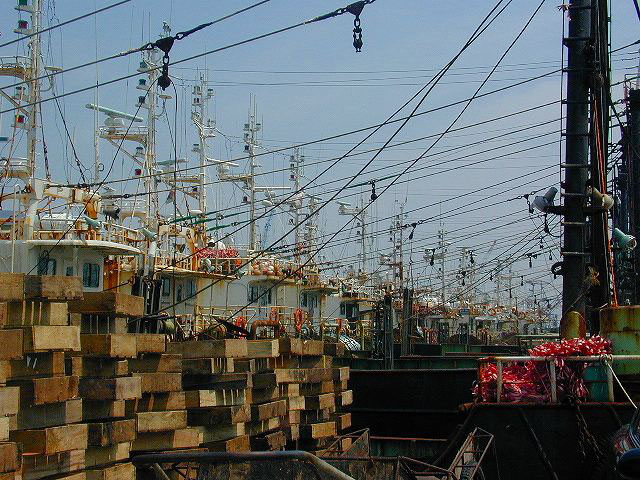 |
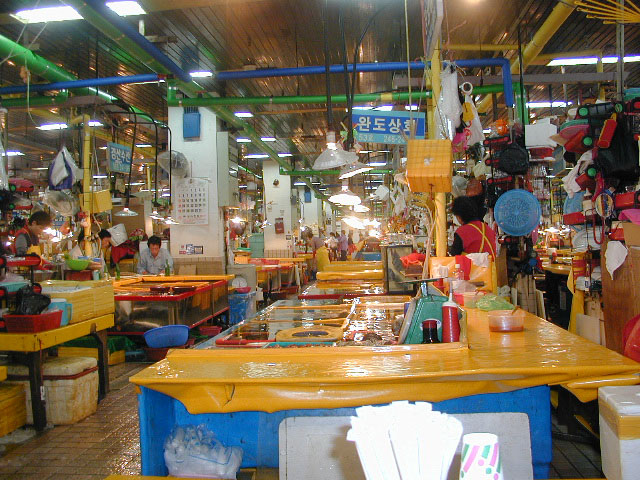 |
(宗廟広場にて)
|
(釜山市内) |
(釜山漁港) |
(釜山・チャガルチ市場) |
|
■PART 4
韓国の公立の小学校についての基本データ
(General information on public elementary schools in South Korea)
★クラスの人数
(How many students are there in a class?) |
35人以下
(Less than 35) |
★英語は何歳からはじめるの?
(When do you start learning English?) |
8歳(=小学3年生)からスタート。
(At the age of 8, Grade 3)
|
★政府は小学校での英語教育を奨励している?
(Is English education from an early age encouraged by the government?) |
している。(Yes.)
|
★小学校での英語の授業は週に何時間あるの?
(On average, how many hours each week does elementary school students study English?)
|
1〜3時間。
(one to three hours )
|
★英語の先生はネイティブ??
(Are English teachers native speakers?) |
公立の小学校ではほとんどいない。
(Hardly any at public elementary schools. )
|
★英語の塾はあるの?
(Are there English cram schools in South Korea?) |
たくさんある。
(Yes. There are many. )
|
★外国人の生徒はいますか?
(Are there foreign students? If so, where are they from?) |
あまりいない。海外に留学する子供は多い。
(Not many. But there are lots of Korean children who go abroad to study English.)
|
★教員養成について
(Are there foreign students? If so, where are they from?) |
小学校の先生は高校や大学の先生と違って、全ての科目を教えます。ですので、英語も教えるのですが、より質の高い授業を求める生徒や親の強い希望により、英語だけを教える先生のいる学校が増えています(ただし、英語に限らず音楽や体育も)。こういった専門の先生たちは、国立機関による訓練や内外のセミナーに参加しなければいけません。
(In South Korea, an elementary school teacher teaches all subjects, unlike in junior high school and high school. So, if an elementary school teacher wants to teach English, then he or she can teach English. At least, this used to be the case. Now there's more pressure from parents to improve their children's English, and so many schools are employing teachers specifically to teach English. It's the same with some of the other subjects, like music and P.E. These teachers have to take specialized training courses organized by the government.)
|
★識字率を教えて!
(What is Your country's literacy rate?) |
97%以上
(Over 97% )
|
|
Photo Courtesy by Mikio SHIGA
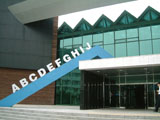 |
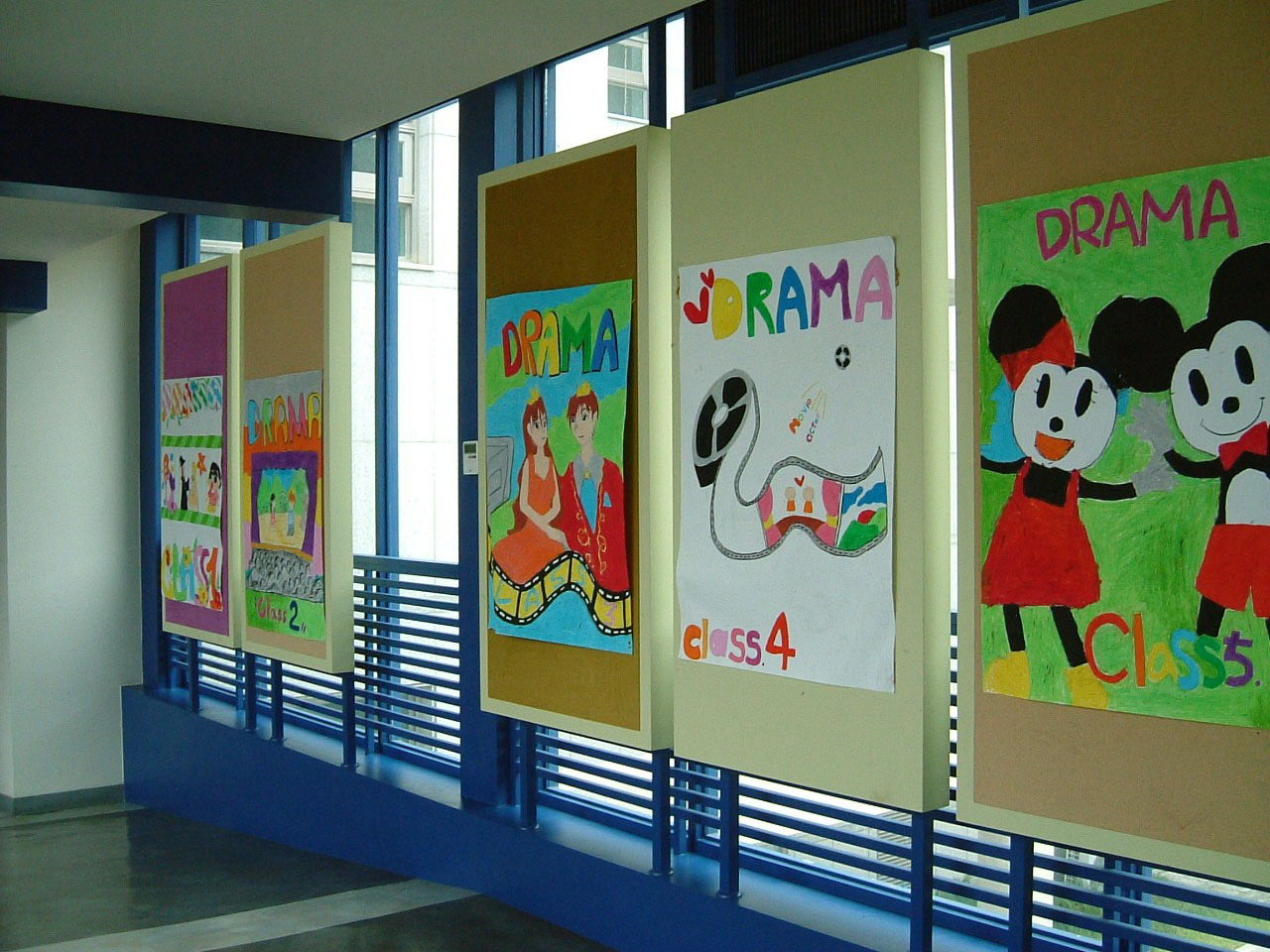 |
 |
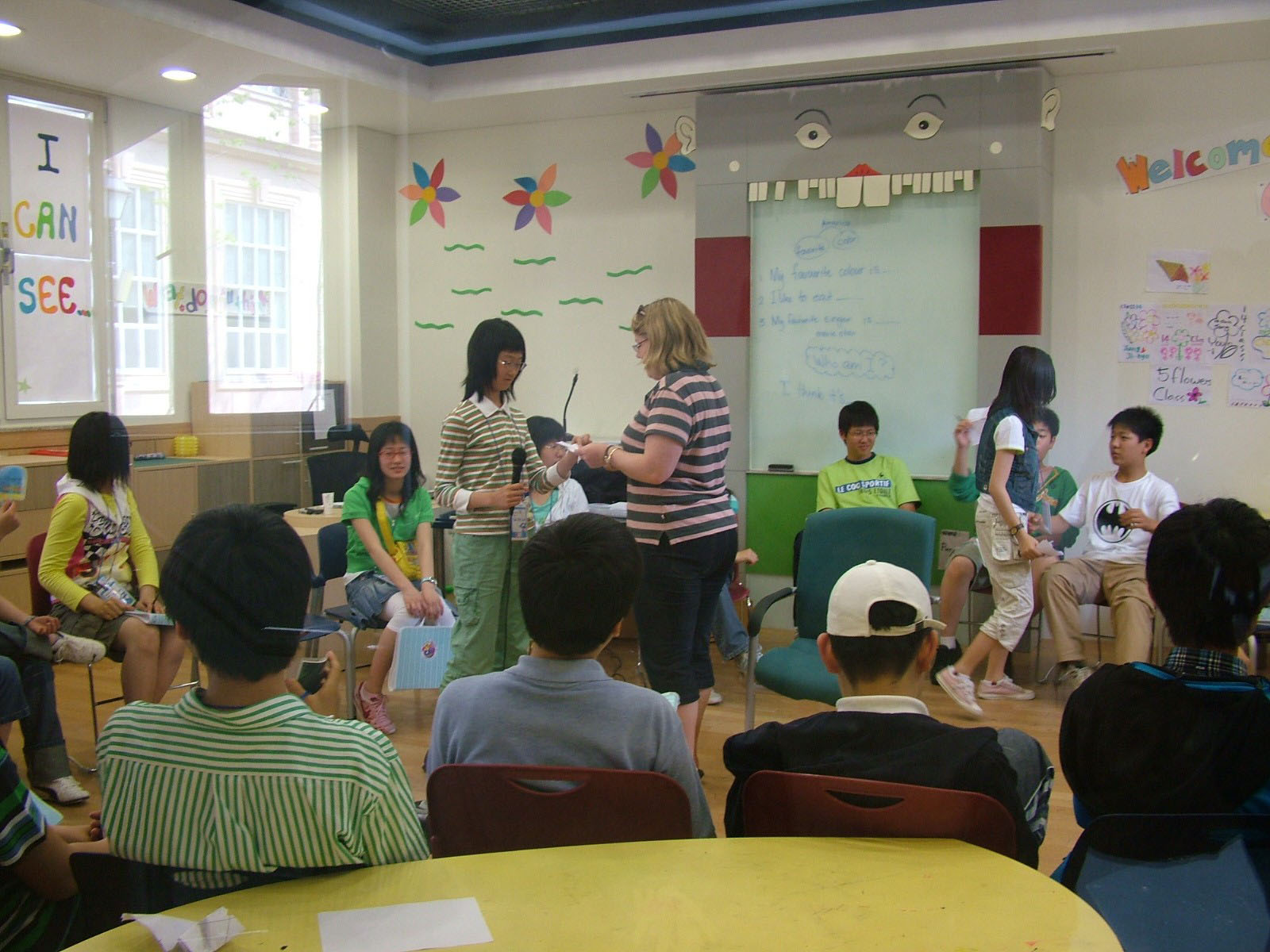 |
(イマージョン教育の一環・
アンサンの英語村の外観)
|
(アンサンの英語村・
中に入るとこんな感じです) |
(パジュの英語村) |
(パジュの英語村・
クラスの様子) |
|
|
■PART 5
韓国の教育制度
(The South Korean Education System)

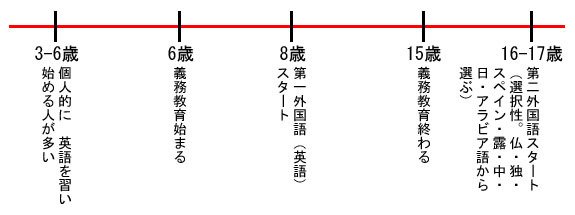
★韓国では、義務教育は6歳から15歳までとなっています。
(It's required by law that all children go to the school between the age of 6 and
15.)
優秀な子どもは、5歳からの入学も可能です。
(If children excel, they can start at age five.)
★英語は小学校3年生〔8歳〕からはじめます。
(English is taught from Grade 3, from the age of eight.)
2008年からは、開始学年が引き下げられ、小学1年(6歳)から始まります。ただ、これには賛否両論あって、これほどまでに早く外国語教育を推し進める必要が果たしてあるのかどうか、母語学習の弊害になるのではないかという疑問の声があがっているのも事実です。
(English may be taught from Grade 1 from 2008. Some people are against it. They are concerned about the children's ability in their mother tongue.)
★高校生になると、英語のほかに、第二外国語(フランス語・ドイツ語・スペイン語・中国語・日本語・ロシア語・アラビア語)の中から1つ選択します。
(When students reach high school, they can choose to study another foreign language: French, German, Spanish, Chinese, Japanese, Russian, and Arabic.)
★学校によっては中学校から第二外国語が学べるところもあります。
(Depending on the school, they may also have the chance to study a second foreign language while at junior high school.)
|
|
|
■PART 6
人々の声
Vox populi
 韓国の主婦が語る、現地英語事情とは?
韓国の主婦が語る、現地英語事情とは?
★
ミンキョンさんは、アメリカでモンテッソーリ教育(※)を学んだ30代の韓国人女性。
小学校でまだ英語は習わなかった世代です。そんな彼女から見た韓国の現代の英語教育は?
(Minkyung is in her 30s and she has studied Montessori in the United States. Her generation didn't study English at elementary school. What is her opinion? )

|
<お腹の中にいるころから英語と接する子供たち>
(Prenatal program)
韓国では胎教が人気なんです。だから、子供はお腹の中にいるころから、英語と接しています。それにほとんどの親が子供を幼稚園の段階から英語を習わせます。特に「会話」です。
幼稚園では、「英語で」何かをするというクラスが多いです。例えば「英語でお料理をする」とか、「英語で音楽を習う」といったように。
(The prenatal program is popular in South Korea. Also, most parents have their kids study English at preschool, focusing more on speaking. Most preschool have English classes and teach English through other activities, such as cooking or music. )
<英語村ができるまで>
( Why "English Village" has been established in South Korea?)
早期英語教育の熱は年々高まり、ついに小学校のうちから母親に付き添ってもらってイギリス、オーストラリア、ニュージーランド、といった国へ留学する子供も出てきました。今ではこれは、中産階級の韓国の家庭ならばよくあることです。お父さんはその留学費用を稼ぐために、韓国に残って一人で働きます。
留学の期間ですが、少なくとも1年は留まる傾向があります。このような傾向や英語熱が、ついには政府に韓国に英語村(※)を建てさせることにつながったのだと私は思います。
(Many parents are so desperate for their children to learn English that they send them abroad, to the United States, Australia, New Zealand, etc. The father usually stays in Korea earning money, while the mother usually goes with the child, and usually they go for about a year. This is common among middleclass families. I think this phenomenon led to the creation of English Village in Korea.)
※モンテッソーリ教育とは…:1970年代にイタリアのマリア・モンテッソーリが開発した幼児教育法。五感をフルに生かし、特別な用具を用いて知性の発達を促す。特にアメリカを中心に広まっている。
(Montessori is a teaching method for young children, introduced by Maria Montessori in Italy. The kids use all five senses to learn, with the aid of some special tools. This method is disseminated around the world, but is mainly practiced in the United States.)
※「英語村」についてはPART6「ここでちょこっと韓国の一面を見てみましょう」を参照
(See Part 6 for more on "English Village")
|
|
 韓国通の日本人から見た、韓国の英語教育とは?
韓国通の日本人から見た、韓国の英語教育とは?
★電気通信大学の助教授で、日本国際教育学会の理事をしている志賀先生。韓国をはじめ、いろいろな国からの留学生に日本語を教えています。志賀先生から見た、韓国の英語教育とは?
(Mr. Shiga is an assistant professor at the University of Electro-Communications. He is also a senior general manager at the Japan International Education Society. Let's hear his opinion.)
|

|
<韓国の言語教育について>
(Language education in South Korea)
小学校に英語の授業を新設することについて、日本でも賛成反対いろいろな議論が出ていますが、韓国でもいろいろな意見が表明されています。つい最近小学校1年生から学校で英語を勉強しようという計画が発表されましたが、すぐに撤回を求めるアピールが出ました。決して皆が英語教育早期開始推進派ではありません。
ほかに、韓国の言語教育で問題となっていることとしては、高校の第二外国語選択の傾向についての問題があります。中国語と日本語に人気が集まり、ドイツ語やフランス語を勉強する人が減っているという問題です。また、国際結婚の増加、特に農村地域での高い国際結婚の割合、あるいは移住労働者の増加という現実への対処という新しい課題も加わっています。
(In Japan, we still haven't decided whether English will be taught at elementary schools. In South Korea, they are already teaching elementary school children English, although not everyone agrees that this is wise. Currently, students choose to study a second foreign language when they are in high school. Most prefer Chinese or Japanese to German or French. Interest in foreign languages is also rising with the growth in the number of international marriages - especially among people from rural areas. Also foreign languages are important for dealing with immigrant workers in South Korea.)
|
|
 ソウルのサラリーマンが語る、早期英語教育について
ソウルのサラリーマンが語る、早期英語教育について
★グンさんは、このサイトに登場してくれたミンジュちゃんの叔父さんです。韓国の早期英語教育について語ってもらいました。
(Gunn is an uncle of Min-ju. Let's hear his opinion on early English education.)
|
|
| 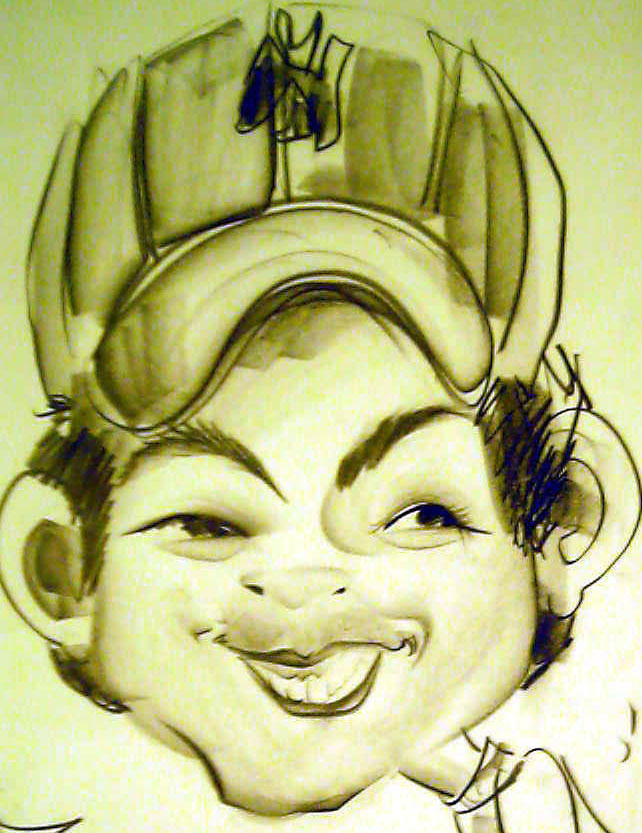
|
<英語教育は早ければ早い方が>
(The earlier the better)
英語教育が2008年から6歳に繰り上がることですか?僕は特に早すぎるとは思いません。英語圏の人々と仕事をしたり、その文化の中で生活したりしたいと思うならば、6歳からの英語教育が早すぎることはないと思います。ただ、自分自身が小学生だとしたら、英語を勉強するのは「ちょっと…」と思うかもしれません。まだ遊んでいたい盛りだし、ストレスが増えそうで嫌だなぁと。
(Studying English from when they're six? If they want to work with English native speakers or live in an English — speaking culture in the future, it's not too early. Though, if I were a child, I would say, "No, thank you," because I'd rather spend time playing with friends and relaxing.)
|
|
|
|
 小学校で英語を習い始めた世代が語る、韓国の英語教育とは?
小学校で英語を習い始めた世代が語る、韓国の英語教育とは?
★カホンさんは、現在フランスに留学中。1997年、韓国の小学校で英語教育が始まったその年、小学3年生でした。
当時の様子を語ってもらいました。
(Kahon studies in France now. She was in the third grade when English was introduces to elementary schools. Let's hear her opinion.)
|
|
| 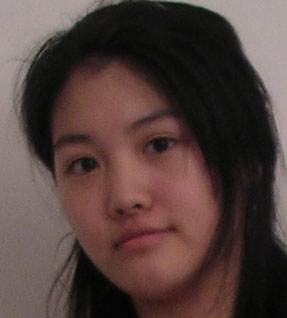
|
<中学では暗記中心の教育>
( Focus on memorizing by rote in junior high school)
私が小学校で英語を勉強し始めたのは3年生の時です。それ以前から、学校によっては高学年で教えている学校もあったようですが、一律で小学3年生からとなったのは1997年からです。学校にネイティブの先生はいなかったので、担任の先生が教えてくれました。主に歌を歌ったり、ゲームをしたりしました。楽しかったですよ。でも、中学校に入るとその勉強法はかなり変わって暗記中心に。「こんなことまで覚えるの?」と思うようなものも多く、つまらなくなりました。
(I was in third grade when I started studying English at school. Schools used to start teaching English later, but the government decided that it would be best to start learning English from Grade 3. My generation was the first to go through this system. There were no teachers from English-speaking countries in my school. My teacher taught us using games and songs. I liked that. It was fun. But once I started going to the junior high, everything changed. I had to memorize so much, an unnecessary amount, and it became boring.)
<大切なのは教え方>
(The teaching method is important)
(2008年から6歳で英語教育が始まることについては)反対です。いくらなんでも早すぎると思うから。親も政府もなんとかして子どもたちが英語を流暢に話せるようにしようと、しゃかりきになっているような気がします。私が思うに、早ければいいという問題ではなく、どのように教えるかということで効果は変わってくるんじゃないかと思います。
(I do think six is too young to start learning English. I think the government and parents expect students to become fluent in English, whereas all we need to do is to learn to speak well when we meet a foreigner.)
|
■PART 7
韓国の子供の一年間
A typical year for Korean Kids

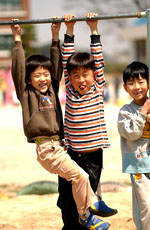
Photo courtesy by Haruna Kosaka |
韓国の子どもたちの間で人気のある祝日
Holidays that are popular among Korean kids are:
1)5月5日(※)の子どもの日−家族で過ごせる僕たちが主役の日
5th of May- because I can stay with my family !
2)1月1日の元日−お年玉がもらえる!
1st of January - because I can get money from adults!
3)クリスマス−プレゼントがもらえる
Christmas! - I can get presents!
※韓国の5月5日は、日本のように鯉のぼりをあげたり、かぶとを飾ったりすることはありません。この日は、家族みんなで公園でピクニックをしたり、友達と伝統的な遊びをしたりします。
(On May 5, there is no special decoration, such as koinobori, in South Korea.
On this day, children spend time with their family, having picnics in the park or enjoying a traditional play.)
|
| |
|
|
|
|
|
|
